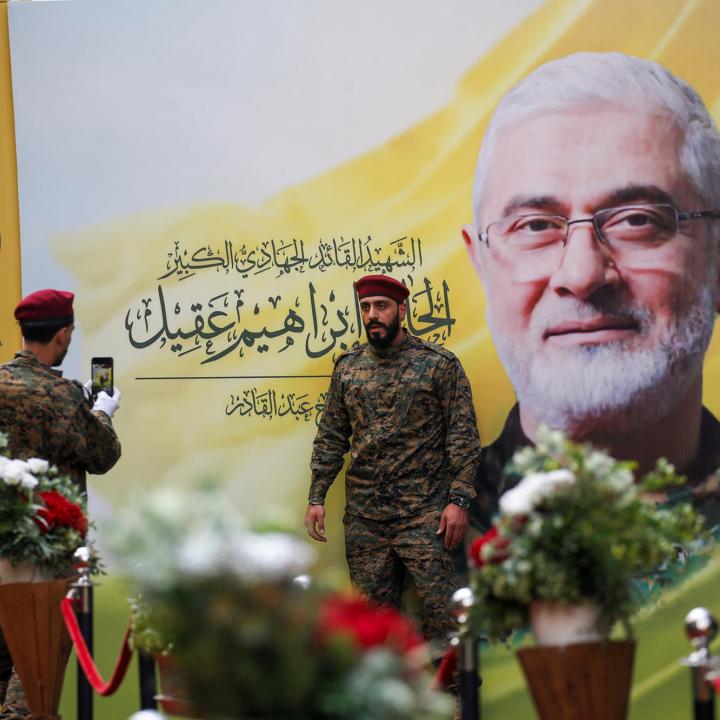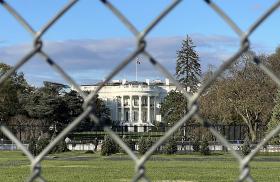
- Policy Analysis
- PolicyWatch 3933
The Death of (Another) Hezbollah Lifer

Like his recently killed predecessor, Ibrahim Aqil had a long history of murdering Americans, Europeans, Israelis, Lebanese, and others perceived as obstacles to Hezbollah’s ambitions, and his experience as a military and terrorist commander will be difficult to replace.
Less than two months after killing senior Hezbollah commander Fuad Shukr, Israeli forces have taken out his successor and longtime comrade-in-arms, Ibrahim Aqil. The September 20 airstrike in Beirut also killed some twenty other commanders in the group’s Radwan special forces.
Much like Shukr, Aqil had risen through the ranks over the course of a multidecade terrorist “career” that began with mass-casualty attacks against Americans. In April 1983, he played a major role in Hezbollah’s bombing of the U.S. embassy in Beirut. Last year, on the fortieth anniversary of that attack, the State Department issued a reward of up to $7 million for information on his whereabouts. In more recent years, Aqil led Hezbollah’s Operations Unit, was part of the triumvirate that led the Jihad Council, and, together with Talal Hamiyah, commanded the Islamic Jihad Organization, the Hezbollah branch in charge of international terrorist activity. How did his career unfold after its murderous origins in 1983? And how will Hezbollah’s latest high-level attrition affect its capabilities?
A Series of Body Blows
The September 20 strike was just the latest in a series of successful Israeli military and intelligence operations against Hezbollah. After killing Shukr in a July airstrike in Beirut, Israel launched a preemptive attack targeting the group’s rocket launch sites in late August, just hours before the group reportedly planned to attack Tel Aviv. In early September, Israeli special forces raided an Iranian facility in Syria, destroying an underground factory producing missiles for Hezbollah. Days later, Israel launched another preemptive airstrike targeting rocket launchers set to fire on Tel Aviv. And just last week, explosive-rigged Hezbollah pagers and walkie-talkies detonated simultaneously across three countries, killing or wounding many Radwan members, other Hezbollah fighters, associated militants in Syria and Iraq, and around forty Yemeni Houthi fighters who were in Lebanon at the time.
With their communications compromised, Aqil and other Hezbollah commanders decided to hold an in-person meeting beneath a residential building in Beirut, apparently believing that gathering underground while using civilians as human shields would protect them. They were wrong.
“Wild, Wild West Beirut”
In April 1985, CIA analysts penned a report titled “Wild, Wild West Beirut,” in which they described how the city’s west side had become riddled with daily turf battles involving the use of car bombs, mortars, and rocket-propelled grenades. It also warned that “West Beirut has earned the reputation of being the most dangerous city in the world for foreigners, especially Americans and Europeans.” One of the key people behind this violence was Ibrahim Aqil (aka Tahsin).
According to Israeli authorities, Aqil “directed” the April 1983 car bomb attack against the U.S. embassy. That July, he reportedly rigged another car bomb that unsuccessfully targeted Lebanese prime minister Shafiq al-Wazzan. And in October, he was a key participant in the deadly bombing of the U.S. Marine barracks, according to the CIA. Aqil also helped provide explosives to the Hezbollah operatives who carried out a series of bombings in Paris in 1985-86, including at the Galeries Lafayette department store. When operative Mohammad Hamadi was arrested at the Frankfurt airport with a wine bottle full of liquid explosives intended for the Paris cell, Aqil helped organize the kidnapping of German citizens in Lebanon to secure his release.
As the State Department noted, Aqil carried out all of these activities as “a principal member of Hezbollah’s Islamic Jihad Organization.” At the request of several countries, Interpol issued multiple Red Notices calling for his arrest due to these plots.
Leading Hezbollah in Syria
Decades later, Aqil “played a vital role in Hezbollah’s military campaign in Syria,” according to information declassified by the U.S. Treasury Department. This included “aiding Hezbollah fighters and pro-Syrian regime troops against Syrian opposition forces.” He worked closely with Shukr and senior military commander Mustafa Badreddine in these operations. Badreddine had overall responsibility for the Syria mission until he was killed in 2016.
When the State Department listed Aqil as a Specially Designated Global Terrorist in 2015, it noted that both he and Shukr sat on the Jihad Council, Hezbollah’s highest military body. After Badreddine’s death, Aqil, Shukr, and Ali Karaki filled his shoes by forming a de facto triumvirate. (As of this writing, reports are emerging that Karaki has been killed as well. If true, this would only magnify the operational impact discussed below and essentially eliminate the circle of experienced senior commanders around Hezbollah leader Hassan Nasrallah.)
Radwan Commander
According to Israeli authorities, Aqil served as the overall commander of the Radwan special forces, “responsible for Hezbollah’s anti-tank, explosives, and air defense operations, among other activities.” He was particularly focused on developing the unit’s ability to storm the border, attack Israeli communities, lay roadside explosives to attack first responders, and kidnap Israelis back into Lebanon—the very playbook that fellow Iranian proxy Hamas used to surprising and devastating effect on Israel’s southern border last October. Aqil and his fellow Radwan commanders called this the “Conquer the Galilee” attack plan. Indeed, at the time of his death, they were planning a cross-border raid in response to last week’s pager attack, according to Israeli authorities.
Aqil also reportedly planned and facilitated multiple terrorist attacks targeting Israel, including the March 2023 incident in which a Hezbollah operative snuck sixty kilometers across the border before planting an explosive at the Megiddo Junction and wounding an Arab Israeli citizen. Another example was the September 2019 attack in which Hezbollah struck an Israeli military ambulance across the border using a Kornet antitank guided missile. In addition to numerous attacks on Israel, Aqil was involved in Hezbollah’s overseas terrorist operations as a member of the Islamic Jihad Organization.
Operational Implications
The deaths of Aqil and around twenty fellow Radwan commanders would present a serious setback for Hezbollah under any circumstances, but especially on the heels of losing Fuad Shukr and some 400 other operatives over the past several months—not to mention last week’s shocking detonation of military communication gear. The group can still launch rockets and drones into Israel, as it has demonstrated in the days since his death, but it is nowhere near as prepared for the inevitable Israeli response as it was just a few days ago. Many Hezbollah operatives are surely looking over their shoulders now, fearing there are moles in the organization and wondering if Israel will take the opportunity to hit their arsenal of longer-range and precision-guided missiles while the group is on its back foot. Meanwhile, the group’s diminished military capabilities increase the likelihood that it will attempt to carry out terrorist attacks abroad. As of this writing, the two adversaries are already engaged in heavy escalation that will further raise the stakes of the group’s decisionmaking—perhaps quite quickly.
Matthew Levitt is the Fromer-Wexler Senior Fellow at The Washington Institute and director of its Reinhard Program on Counterterrorism and Intelligence. His previous projects include the interactive Hezbollah Worldwide Activities Map and the just-updated book Hezbollah: The Global Footprint of Lebanon’s Party of God.



